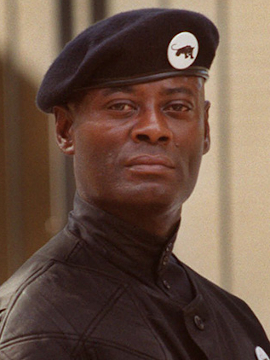Khalid Abdul Muhammad facts for kids
Quick facts for kids
Khalid Muhammad
|
|
|---|---|

Muhammad, c. late 1990s
|
|
| Born |
Harold Moore Jr.
January 12, 1948 |
| Died | February 17, 2001 (aged 53) |
| Resting place | Ferncliff Cemetery |
| Alma mater | Pepperdine University |
| Occupation | Minister, activist |
| Organization | New Black Panther Party |
Khalid Abdul Muhammad (born Harold Moore Jr.; January 12, 1948 – February 17, 2001) was an African-American minister and activist. He became a well-known figure in the Nation of Islam and later the New Black Panther Party. After a controversial speech in 1993, Muhammad was removed from his role in the Nation of Islam by Louis Farrakhan. He was also criticized by the United States Congress.
After leaving the Nation of Islam, he became the leader of the New Black Panther Party. He held this position until his death in 2001. He believed in black independence and supported the idea of people marrying within their own race.
Contents
Early Life and Education
Khalid Muhammad, whose birth name was Harold Moore Jr., grew up in Houston, Texas. He attended Bruce Elementary School, E.O. Smith Junior High School, and Phyllis Wheatley High School.
After high school, he studied theology at Dillard University in Louisiana. He also worked as a minister at Sloan Memorial Methodist Church. Later, he went to Pepperdine University and earned his college degree.
Joining the Nation of Islam
In 1970, while at Dillard University, Khalid Muhammad joined the Nation of Islam. This group was led by Elijah Muhammad at the time. He changed his name several times, eventually becoming Khalid. In 1983, Louis Farrakhan, another leader, gave him the name Khalid. It was inspired by a famous Islamic general, Khalid ibn al-Walid.
By 1984, Muhammad had become one of Louis Farrakhan's most trusted advisors. He traveled to Libya to raise money and met the country's leader, Muammar al-Gaddafi. Muhammad's strong dedication made him the national spokesman for the Nation of Islam. He worked at their mosques in New York and Atlanta during the 1980s. After some time away, he returned to the Nation of Islam in 1991. He then became Farrakhan's national advisor.
The 1993 Speech and Its Impact
In 1993, Muhammad gave a speech at Kean College in New Jersey. In this speech, he made strong and controversial statements about different groups of people. Both the United States Senate and the United States House of Representatives voted to condemn his speech.
Louis Farrakhan, the leader of the Nation of Islam, publicly disagreed with the "tone" of Muhammad's speech. However, Farrakhan also said there were "truths" in what Muhammad said. Because of the speech, many members of the Congressional Black Caucus (CBC) distanced themselves from the Nation of Islam. The CBC chairman, Kweisi Mfume, also ended his relationship with the group.
In February 1994, Farrakhan removed Muhammad from his role as the Nation of Islam's spokesman. He was also suspended from the organization. In May 1994, Muhammad was shot after giving a speech at the University of California, Riverside. He survived the shooting.
Leading the New Black Panther Party
After leaving the Nation of Islam, Muhammad became the national chairman of the New Black Panther Party. On May 21, 1997, he gave another strong speech at San Francisco State University. In this speech, he again criticized various groups.
In 1998, Muhammad organized the "Million Youth March" in New York City. About 6,000 people attended. The march was controversial because New York mayor Rudy Giuliani tried to stop it. He called it a "hate march." A court allowed the event to happen but made it shorter and smaller.
At the end of the rally, police came in to break up the crowd. Muhammad encouraged the participants to resist the police. Many people were arrested, and several officers and civilians were injured. Mayor Giuliani said the march was exactly what he expected, "filled with hatred" and "horrible." Muhammad organized a second march in 1999.
Musical Influence
Khalid Muhammad was a well-known speaker on African history and culture. Because of this, several hip-hop artists used parts of his speeches in their songs.
Public Enemy used a quote from him in their 1988 song "Night of the Living Baseheads". The quote was about how African Americans lost their names, language, and culture when they were brought to America.
He also appeared on Ice Cube's albums Death Certificate (1991) and Lethal Injection (1993). He was featured as a guest rapper on songs like "Death" and "The Birth." Ice Cube also mentioned Muhammad in the song "Hand of the Dead Body." On MC Ren's 1996 album The Villain in Black, Muhammad spoke on the track "Muhammad Speaks" about the history of African-American rights.
After his death, Muhammad's words continued to be used in music. For example, The Used sampled his "Kill the White Man" speech in 2009. Chase & Status used an interview with him in their song "Hocus Pocus." D'Angelo also included parts of his speeches in the song "1000 Deaths" on the 2014 album Black Messiah.
Personal Life
Khalid Muhammad had five children. One of his children is Farrah Gray, who grew up in Chicago. Farrah Gray became a successful business person. He said his father inspired him with confidence, even though they only saw each other occasionally. Farrah Gray did not join his father's political activities.
Death
In 2001, Khalid Muhammad died suddenly from a brain aneurysm in Atlanta, Georgia. He was 53 years old. He was buried in Ferncliff Cemetery in New York, near the grave of Malcolm X.
See also
- African American–Jewish relations
- Black separatism
- Nation of Islam and antisemitism

